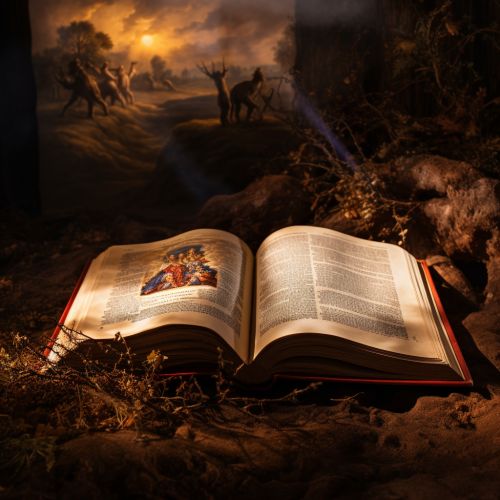Books of the Bible
Introduction
The Books of the Bible are a collection of religious texts that are considered sacred and authoritative by different religious groups including Jews, Christians, and others. These books are divided into two main sections: the Old Testament and the New Testament. The Old Testament contains books that are sacred in both Judaism and Christianity, while the New Testament contains writings that are exclusively Christian.


Old Testament
The Old Testament, also known as the Hebrew Bible, is a collection of books that were written before the birth of Jesus Christ. It is divided into three main sections: the Torah (the Law), the Nevi'im (the Prophets), and the Ketuvim (the Writings).
Torah
The Torah, also known as the Pentateuch, is the foundational text of the Jewish faith. It consists of five books: Genesis, Exodus, Leviticus, Numbers, and Deuteronomy. These books narrate the creation of the world, the early history of humanity, the origins of the Israelite people, their journey to the Promised Land, and the laws that God gave them.
Nevi'im
The Nevi'im, or Prophets, is the second section of the Old Testament. It is divided into two subsections: the Former Prophets (Joshua, Judges, Samuel, and Kings) and the Latter Prophets (Isaiah, Jeremiah, Ezekiel, and the Twelve Minor Prophets). These books contain historical narratives, prophetic oracles, and moral teachings.
Ketuvim
The Ketuvim, or Writings, is the third and final section of the Old Testament. It includes a diverse collection of books such as Psalms, Proverbs, Job, Song of Songs, Ruth, Lamentations, Ecclesiastes, Esther, Daniel, Ezra-Nehemiah, and Chronicles.
New Testament
The New Testament is the second part of the Christian Bible and is exclusive to Christianity. It is composed of 27 books that were written after the death and resurrection of Jesus Christ. These books are divided into four main sections: the Gospels, the Acts of the Apostles, the Epistles, and the Book of Revelation.
Gospels
The Gospels are the first four books of the New Testament: Matthew, Mark, Luke, and John. These books narrate the life, teachings, death, and resurrection of Jesus Christ.
Acts of the Apostles
The Acts of the Apostles, often simply referred to as Acts, is a historical narrative that describes the early Christian community, the spread of Christianity, and the activities of the apostles after the ascension of Jesus Christ.
Epistles
The Epistles, or letters, are a collection of writings addressed to early Christian communities or individuals. They provide theological teachings, moral guidance, and pastoral advice. The Epistles are further divided into the Pauline Epistles and the General Epistles.
Book of Revelation
The Book of Revelation, also known as the Apocalypse, is the final book of the New Testament. It presents a series of visions that predict the end of the world, the final judgment, and the eternal reign of God.
Conclusion
The Books of the Bible are a collection of diverse texts that have shaped the religious, moral, and cultural values of billions of people throughout history. They continue to be a source of inspiration, guidance, and spiritual nourishment for believers around the world.
